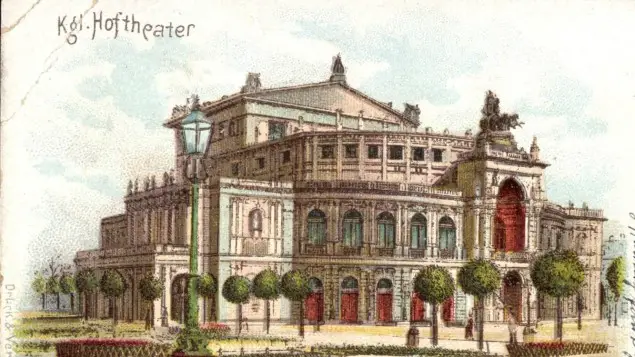The series about historical places of opera art. Get to know exciting excursion and travel ideas for opera lovers. This time: Dresden and Wagner
All Destinations on google maps with links to detailed Blogposts:
Richard Wagner in Dresden

Richard Wagner was born in Leipzig and spent much of his childhood in Dresden. Due to the early deaths of his father and stepfather, he lived with various families even outside of Dresden. Wagner’s siblings were very musical and due to his stepfather’s theatrical activities, Richard and his siblings came into contact with the stage at an early age. At sixteen, Richard left Dresden to study in Leipzig.
In 1842, after 10 years of wandering, Wagner returned to the Dresden Court Theater. First for the performance of his works and two years later as court conductor. His “Liebesmahl der Apostel” was first given in the Frauenkirche with an impressive performance (the church was destroyed in World War II). Next he staged his opera “Rienzi” and had a great success with it.
Next was the flying Dutchman. The premiere took place on January 2, 1843, at the Royal Court Theater in Dresden. Wagner himself stood on the conductor’s podium. After the triumphant premiere of Rienzi at the same venue three months earlier, Wagner hoped for another success. He was disappointed, however, and the audience received his music extremely lukewarmly, and the production was terminated after four performances. Wilhelmine Schröder-Devrient was said to have been an impressive Senta, but the staging and the other singers did not meet Wagner’s expectations. The success of the Dutchman did not really take off until the adapted version of the Zurich production of 1852. This was followed two years later by the premiere of “Tannhäuser”.
Wagner loved to walk in nature during the summer months. Several times he spent weeks and months in the Saxon Switzerland in Graupa/Pirna. He also found inspiration for the medieval legends at Schrekow Castle in nearby Teplice and at Wartburg Castle in Eisenach.
He met the revolutionary Bakunin as an active participant in the May Uprising. Finally, in 1849, he had to flee the city as a wanted revolutionary. His path led him first to Weimar.
LINK TO THE COMPLETE WAGNER BIOGRAPHY
The building of the Court Opera burned down completely in 1869.
Court opera Dresden:





Leave a Reply
Want to join the discussion?Feel free to contribute!